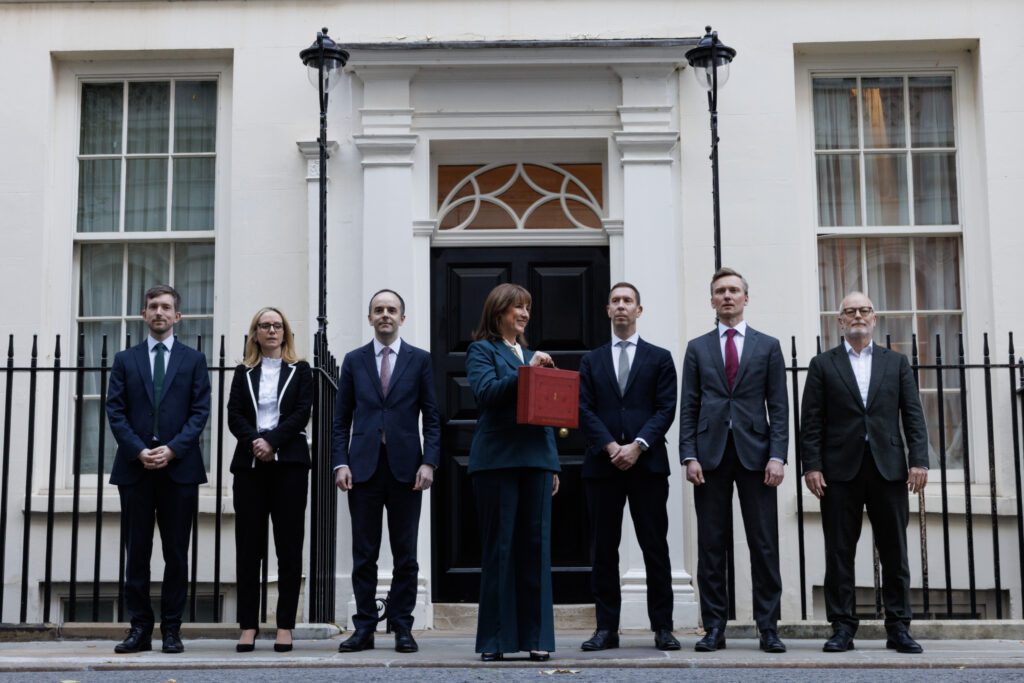The details of Rachel Reeves’s second Budget emerged earlier than planned after the Budget watchdog, the Office for Budget Responsibility (OBR), accidentally released its analysis, outlining a range of tax increases she was set to introduce in a bid to address the shortfall in the public finances.
Reeves’ long-awaited and much-anticipated Budget sets out the UK’s economic and fiscal prospects for the period to 2030–31, incorporating new data with the Government’s latest policy measures. The Budget forecasts an average real GDP growth of 1.5 per cent over the projection period; the figure is slightly weaker than anticipated in March 2025 due to a downgrade to forecast productivity growth.
The repercussions of underperformance and weak recovery
The Budget now expects underlying productivity to grow at 1 per cent, a drop from 1.3 per cent, a figure reflecting a decade of persistent underperformance and flailing signs of recovery following recent economic shocks. Although real economic growth is weaker, the Budget expects higher near-term nominal wage growth and slightly increased inflation, meaning nominal GDP will fall short of spring forecasts by only about one percentage point. This combination is “more tax rich”, as a greater share of income comes from labour – which is taxed more heavily than corporate profits.
The impact of inflation
The Budget’s holistic economic outlook has been moulded by continued inflationary pressures. Consumer Price Index (CPI) inflation is expected to average 3.5 per cent in 2025 and 2.5 per cent in 2026, both higher than previously expected, owing to stronger wage settlements and more persistent domestic inflation. Inflation is not expected to return to the Bank of England’s 2 per cent target until 2027, a year later than forecast in March.
The OBR’s economic forecast: unemployment and earnings
Low weekly earnings are forecast to grow by around 5 per cent in 2025, before gradually slowing. Unemployment is likely to hover near 5 per cent until 2027, reflecting subdued business confidence and rising inactivity, before falling back to the estimated equilibrium rate of 4 per cent. Real household disposable income growth remains weak, averaging just 0.25 per cent per year, well below historical norms.
A new tax forecast
On the fiscal side, tax receipts are expected to be £16 billion higher in 2029–30 than in March’s forecast, driven largely by higher earnings and inflation. Income tax, National Insurance contributions, and VAT all rise relative to expectations.
However, these gains are outweighed by an estimated £22 billion increase in pre-measures public spending by 2029–30. Key drivers include higher welfare spending – particularly disability-related benefits – increased debt interest, and sharply rising local authority expenditure, especially on special educational needs and disabilities (SEND) provision. As a result, baseline borrowing is now £17 billion higher this year and £6 billion higher in 2029–30 than previously forecast.
Additional spending announced
Reeves’ Budget measures significantly alter the UK’s fiscal profile. Additional spending – particularly the reversal of cuts to winter fuel payments, changes to health-related benefits, and the removal of the Universal Credit two-child limit – adds £11 billion to borrowing by 2029–30.
Tax rises, however, more than offset these pressures in later years. Freezing personal tax thresholds beyond 2028, aligning National Insurance on salary-sacrificed pension contributions, and increasing taxes on dividends, savings, and property incomes are collectively expected to raise £26 billion per year by 2029–30. The overall tax burden is projected to reach an all-time high of 38 per cent of GDP by 2030–31 – five percentage points higher than before the pandemic.

Ongoing risks to the Budget’s success
Borrowing is projected to fall from 4.5 per cent of GDP in 2025–26 to 1.9 per cent by 2030–31. Nevertheless, public sector net debt continues to rise, peaking at 97 per cent of GDP in 2028–29 before easing slightly. The Government meets its fiscal mandate – achieving a current budget balance by 2029–30 – with a margin of £22 billion, though the OBR warns this remains small relative to historical forecast errors and ongoing risks.
Such risks include uncertainty surrounding productivity growth, interest rate fluctuations, equity market corrections, rising disability caseloads, local authority financial pressures, and uncosted spending commitments in defence and asylum systems.
Fuel and energy announcements
Reeves also announced an extra £505m for the Welsh Government over the spending review period. She also confirmed that, from 2028, electric vehicle drivers will face a new per-mile road charge.
Fuel duty is also set to rise for the first time in 16 years. In the prematurely released Budget document, the OBR said the 5p per litre cut introduced by the Conservative Government in March 2022 would be extended only until September 2026, after which it would be phased out through a staggered increase.
The Chancellor announced that the Government will end the Energy Company Obligation (ECO) scheme, a programme intended to reduce carbon emissions and support households in fuel poverty.
Reeves said the scheme currently adds £1.7bn a year to household energy bills, and that 97 per cent of families in fuel poverty have paid more into it than they have benefited from. As a result, she claimed, the Government will remove the charge from April, cutting around £150 from the average household’s annual energy bill.
Balancing the need to maintain reliable road funding with the goal of encouraging zero-emission transport remains challenging for the Government. The Chancellor’s announcement represents an initial move toward establishing a long-term funding approach that aims to support the upkeep and safety of the road network in the years ahead.
ISA limit reduction
Reeves also announced the reduction of the annual cash Individual Savings Account (ISA) limit from £20,000 to £12,000 in today’s Budget, along with an exemption for those over 65 who will be able to continue to save up to £20,000 in cash ISAs. Reeves stated her explicit aim to “reform our ISA system keeping the full £20,000 allowance while designating 8,000 of it exclusively for investment”.
The new limit for the cash ISA limit is expected to encourage over 2 million people to consider investing in the stock market, rather than holding all of their long-term savings in cash where they may be eroded by inflation. While it remains important for individuals to retain some cash savings for emergencies, Labour’s plan here demonstrates their intention to support more people to explore longer-term investment options, strengthening financial resilience and contributing to wider economic activity.
Attacks from the opposition
Leader of the Opposition Kemi Badenoch focussed her rebuttal on the disjunct between Labour’s welfare priorities and the Conservative’s heightened focus on employment and getting people into work. She questioned “why anyone should believe anything Reeves says”, insisting that “Labour have lost control of welfare spending”.
She particularly criticised Labour’s scrapping of the two-child benefit cap, claiming that the Conservative Government implemented the legislation in the first place to encourage people on benefits to spend their money “responsibly”. “People are frightened”, Badenoch insisted, citing the UK’s urgent need to get people “in work”, not merely having money thrown at obfuscatory and misguided “welfare spending”. “This country works when you make the country work for them” – “let’s get the country working again”, she insisted.
Final thought
While Reeves insists that her Budget improves the UK’s fiscal position on paper, the OBR’s analysis concludes that the UK’s public finances are set to remain “relatively vulnerable to future shocks”, with debt at historic highs and interest payments consuming a growing share of national income. Disapproval from the opposition, but more importantly resistance from Labour’s own backbenchers, will also be obstacles that will demand parlaying and action in Parliament, because Budget dissenters will have every reason to equivocate, amend and quibble with the Budget to slow its progress.



